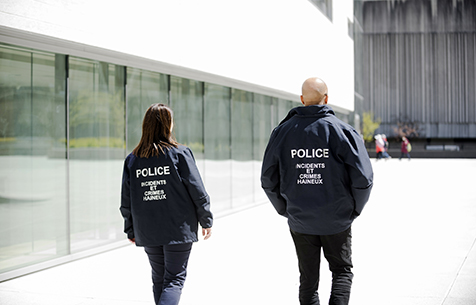
Module des incidents et des crimes haineux (MICH)
Since 2016, the Module des incidents et des crimes haineux (MICH) has been reporting to the Division de la prévention et de la sécurité urbaine (DPSU) of the Service de police de la Ville de Montréal (SPVM). The MICH was created from a joint desire by the SPVM and the Ville de Montréal to develop a specialized unit to exclusively handle hate incidents and crimes across Montréal.
The MICH is made up of a lieutenant detective, two sergeant detectives and two specialized consulting officers. The sergeant detectives are mandated to investigate and press criminal charges, where applicable, with the victim’s cooperation. The specialized consulting officers are in charge of logging, analyzing and quantifying these types of incidents and crimes. They also use prevention methods adapted to the concerns and realities encountered which are often combined with social problems. These officers also carry out community initiatives during presentations to representatives from diverse cultural communities.
Moreover, a civilian strategic planning advisor, who works at the DPSU, supports the team to explore the best practices in this field. Members of the MICH can also rely on support provided by investigators from the four investigation centres in Montréal, which each bring together around 60 sergeant detectives. In addition, members of the MICH act as resource persons for all of their colleagues at the SPVM.
RECOGNIZE AND REPORT
Centralized handling of complaints
The handling of complaints and incident reports linked to hate incidents and crimes is accordingly centralized by the MICH. This allows the module to develop more in-depth expertise, gain an overall view of current issues, monitor the evolution of such issues, and consolidate partnerships with the various cultural communities.
In Québec, the SPVM is one of the rare police forces to handle hate incidents. By applying its innovative and unique approach, the MICH handles these incidents to prevent them from turning into hate crimes.
Other examples of interventions
Created to respond to several challenges, including discrimination and polarization of ideas, the module operates transversally. For example, the module investigates hate speech, takes action against individuals spreading hate speech, but also intervenes in conjunction with partners, family and friends, and the targeted population whose sense of safety is impacted.
The MICH team also ensures vigilance, in cooperation with local police chiefs, over targeted populations’ sense of safety. They identify early signs of hate and hate crimes and take part in creating community security plans.
Recognizing the rise in hate speech on social networks, the MICH carries out numerous investigations relating to criminal and non-criminal speech online. This module has expertise in relation to the spectrum of freedom of speech on social media.
Schedule
The MICH team works from Monday to Friday from 7.00 a.m. to 4.30 p.m..
Extended service offering
Multilingual service
The team of investigators from the MICH offers a service in English and French and uses an interpreting service where necessary. At the SPVM, it can also rely on collaboration by police officers from diverse cultural communities to provide its service in several languages. As a result of the bonds developed with different community groups, the MICH team benefits from the support of stakeholders from these groups to offer services that meet victims’ needs and are culturally adapted.
Partnerships
Members of the module also take part in creating and deploying action by the cellule prévention of the Structure de gestion policière contre le terrorisme (SGPCT). They have links with partner organizations, including the Centre de prévention de la radicalisation menant à la violence (CPRMV) and the équipe polarisation at the Centre intégré universitaire de santé et de services sociaux (CIUSSS). Moreover, they work closely with the Integrated National Security Enforcement Teams (INSETs), the Section antiterrorisme et mesures d'urgence (SAMU) and the Renseignement.
Expertise and influence
The MICH is an example for other police forces. Many calls from researchers and police officers who wish to learn about its service offering demonstrate the enthusiasm and interest for its innovative approach.
Thanks to their experience and knowledge, members of the MICH take part in the CIMT (Coordonnateur d'information sur la menace terroriste) training program and deliver courses on Hate crimes and incidents and Cultural diversity. In addition, members of the MICH are often called to provide training to other police forces, students and public colleges and universities, members of diverse communities, etc.
It should be noted that the investigators’ specialization in handling hate cases leads to the courts ruling more frequently on offences which were previously not widely applied.
Lastly, the SPVM leads a fight against combating this form of crime regardless of this seriousness of the act. It is essential for the Service to raise public awareness of the phenomenon of hate crimes and encourage vigilance.
To find out more
Webinaire « Une société plurielle et harmonieuse, un idéal réalisable? (bilingual video)
Brigade des espaces publics (french only)
Équipe de soutien aux urgences psychosociales - ESUP (english)
Équipe mobile de référence et d’intervention en itinérance - EMRII (english)
E=MC2 au service des personnes en situation d’itinérance (english)
Équipe métro d’intervention communautaire - EMIC (french only)
Patrouilles conjointes autochtones (french only)
Formation en endiguement et en désescalade (english)
Patrouilleurs RIC (Réponse en intervention de crise (english)
Modèle Intervention auprès des aînés maltraités –IPAM (english)



